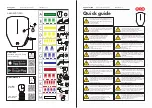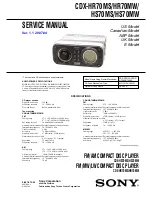
Transporting Pets
Air Bags deploying in the front seat could harm your pet.
An unrestrained pet will be thrown about and possibly
injured, or injure a passenger during panic braking or in
a collision.
Pets should be restrained in the rear seat in pet harnesses
or pet carriers that are secured by seat belts.
ENGINE BREAK-IN RECOMMENDATIONS
A long break-in period is not required for the engine and
drivetrain (transmission and axle) in your vehicle.
Drive moderately during the first 300 miles (500 km).
After the initial 60 miles (100 km), speeds up to 50 or
55 mph (80 or 90 km/h) are desirable.
While cruising, brief full-throttle acceleration within the
limits of local traffic laws contributes to a good break-in.
Wide-open throttle acceleration in low gear can be detri-
mental and should be avoided.
The engine oil installed in the engine at the factory is a
high-quality energy conserving type lubricant. Oil
changes should be consistent with anticipated climate
conditions under which vehicle operations will occur. For
the recommended viscosity and quality grades, refer to
“Maintenance Procedures” in “Maintaining Your Ve-
hicle”.
CAUTION!
Never use Non-Detergent Oil or Straight Mineral Oil
in the engine or damage may result.
NOTE:
A new engine may consume some oil during its
first few thousand miles (kilometers) of operation. This
should be considered a normal part of the break-in and
not interpreted as an indication of difficulty.
92
THINGS TO KNOW BEFORE STARTING YOUR VEHICLE
Summary of Contents for 2013 Dart
Page 4: ......
Page 7: ...1 INTRODUCTION 5 ...
Page 10: ......
Page 73: ...Not Seated Properly Not Seated Properly 2 THINGS TO KNOW BEFORE STARTING YOUR VEHICLE 71 ...
Page 74: ...Not Seated Properly Not Seated Properly 72 THINGS TO KNOW BEFORE STARTING YOUR VEHICLE ...
Page 100: ......
Page 145: ...3 UNDERSTANDING THE FEATURES OF YOUR VEHICLE 143 ...
Page 146: ...144 UNDERSTANDING THE FEATURES OF YOUR VEHICLE ...
Page 147: ...3 UNDERSTANDING THE FEATURES OF YOUR VEHICLE 145 ...
Page 179: ...Voice Tree 3 UNDERSTANDING THE FEATURES OF YOUR VEHICLE 177 ...
Page 181: ...3 UNDERSTANDING THE FEATURES OF YOUR VEHICLE 179 ...
Page 192: ...Voice Tree 190 UNDERSTANDING THE FEATURES OF YOUR VEHICLE ...
Page 194: ...192 UNDERSTANDING THE FEATURES OF YOUR VEHICLE ...
Page 196: ...194 UNDERSTANDING THE FEATURES OF YOUR VEHICLE ...
Page 198: ...196 UNDERSTANDING THE FEATURES OF YOUR VEHICLE ...
Page 200: ...198 UNDERSTANDING THE FEATURES OF YOUR VEHICLE ...
Page 239: ...One Half Second Tone Slow Tone 3 UNDERSTANDING THE FEATURES OF YOUR VEHICLE 237 ...
Page 240: ...Slow Tone Fast Tone 238 UNDERSTANDING THE FEATURES OF YOUR VEHICLE ...
Page 241: ...Fast Tone Fast Tone 3 UNDERSTANDING THE FEATURES OF YOUR VEHICLE 239 ...
Page 282: ......
Page 287: ...INSTRUMENT CLUSTER BASE 4 UNDERSTANDING YOUR INSTRUMENT PANEL 285 ...
Page 288: ...INSTRUMENT CLUSTER PREMIUM ANALOG 286 UNDERSTANDING YOUR INSTRUMENT PANEL ...
Page 289: ...INSTRUMENT CLUSTER PREMIUM DIGITAL 4 UNDERSTANDING YOUR INSTRUMENT PANEL 287 ...
Page 384: ......
Page 444: ...442 STARTING AND OPERATING ...
Page 490: ......
Page 574: ......
Page 582: ......
Page 593: ...INDEX 10 ...
Page 614: ......
















































